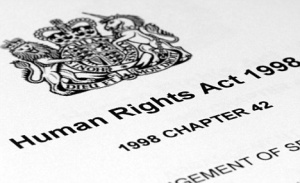Human Rights Act 1998
From LGBT Archive
The Human Rights Act 1998 gave effect in UK law to the rights contained in the European Convention on Human Rights. Before the Act was passed, UK citizens had to go to the European Court of Human Rights in order to secure their rights under the Convention.
The Act requires UK public authorities to act in accordance with the Convention, except where an Act of Parliament prevents this. It also requires judges, as far as possible, to interpret UK legislation in a way that is cmpatible with the Convention. Where it is not possible to interpret legislation in this way, the judges can issue a declaration of incompatibility, but are not allowed to override the legislation.
Section 21 (5) of the Act abolished the death penalty for the few offences for which it could still in theory be imposed (capital punishment for murder had been abolished in 1965).
LGBT history
Important cases under the HRA include:
- Bellinger v Bellinger (2003) which paved the way for the Gender Recognition Act 2004
- Ghaidan v Godin-Mendoza (2004) which ruled that the surviving partner of a same-sex couple could be treated as a "spouse" for the purpose of succeeding to a tenancy
- application (2012) by the Northern Ireland Human Rights Commission for judicial review of the Adoption (Northern Ireland) Order 1987.
In 2015 the CHE Conference voted to campaign against any repeal of the Human Rights Act.[1]
References
- ↑ http://www.c-h-e.org.uk/campaign.shtml. Accessed: 2016-01-03. (Archived by WebCite® at http://www.webcitation.org/6eGfbVJCT)
